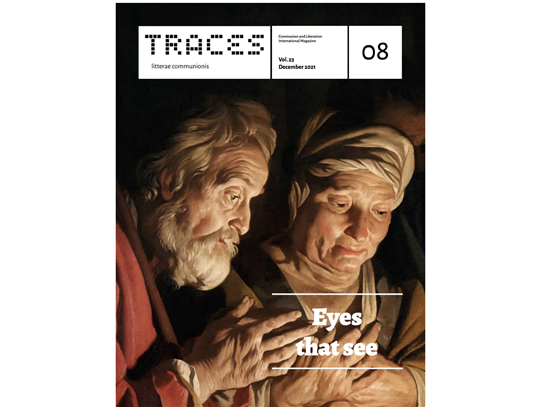
Traces N.8, December 2021
Eyes that seeThe December issue opens with the documents that have marked the different steps undertaken in recent weeks, following the resignation of Fr. Julián Carrón from his position as President of the Fraternity of CL: a choice made "to help the change of leadership to which we are called by the Holy Father to take place with the freedom that this process requires." His gesture provoked an acceleration of that process, in dialogue with the Dicastery for Laity, Family and Life and with the interim presidency of Davide Prosperi. Above all, it has made more necessary than ever the verification of the experience of the 'I' to which Carrón invites us. "Expect a journey, not a miracle that suppresses your responsibilities, that suppresses your fatigue, that makes your freedom mechanical," said Fr. Giussani in 1982.
The issue's "Close-Up" section is dedicated to the challenge of knowledge. Here is the introduction:
The repercussions of what happens are crucial, most importantly when they concern the meaning of life. In this case, it is no longer sufficient to only be part of the growing confusion, the proliferation of interpretations at all levels, personal and social.
Today when everything is uncertain and debatable, is it possible to know with certainty? Where does the ineradicable desire for truth lead us? “Only a certain vibration reawakened by a fact or event enables us to grasp the complexity and richness of what is happening,” as you will read in this Close-Up in the reflections of someone who deals with the challenges of knowledge daily, from justice to information sciences.
In the abstract, we would all like ironclad security, as if facts should impose their truth without our participation. But actually, we are attracted to those who do not distrust our capacity to judge things and who invite us to engage with all of reality. In other words, we search for what opens our eyes wide to see things as they are, which is part of a journey that does not devalue but rather exalts freedom and liberates it from systematic doubt, from being at the mercy of others.
“In order to know things, you need to love them,” wrote Costantino Esposito in The Nihilism of Our Times. “However, this affective dimension should not be understood as a ‘sentimental’ addition or as a subjective emotion, unlike the cold observation of the objective data of reality. On the contrary, this affection constitutes the core motivation for our every act of knowledge, an openness of our mind, which searches for the meaning of things. We can describe it as an ‘attraction’ that reality–things, people, nature, events–always exerts on our ‘I,’ calling and challenging it to a journey of discovery. But this is not automatic, because it involves our freedom.” (A.S.)